| Listing 1 - 10 of 15 | << page >> |
Sort by
|
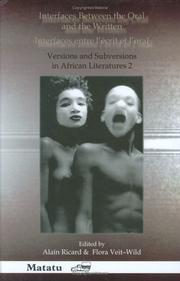
ISBN: 1423791266 9781423791263 9042019379 9789042019379 Year: 2005 Volume: no. 31-32 2 v. 2 Publisher: Amsterdam New York Rodopi
Abstract | Keywords | Export | Availability | Bookmark
 Loading...
Loading...Choose an application
- Reference Manager
- EndNote
- RefWorks (Direct export to RefWorks)
Oral-formulaic analysis. --- Oral tradition --- Folk literature, African --- African literature --- Formulaic analysis, Oral --- Folk literature --- Folklore --- History and criticism. --- History and criticism --- Methodology
Book
ISBN: 3110938197 9783110938197 9783598774621 3598774621 Year: 1991 Publisher: Stuttgart B.G. Teubner
Abstract | Keywords | Export | Availability | Bookmark
 Loading...
Loading...Choose an application
- Reference Manager
- EndNote
- RefWorks (Direct export to RefWorks)
Epic poetry, Greek --- Oral-formulaic analysis. --- Formulaic analysis, Oral --- Folk literature --- Folklore --- Oral tradition --- History and criticism. --- History and criticism --- Methodology --- Homer. --- Homer
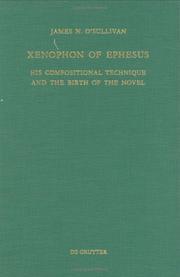
ISBN: 3110143100 3111878481 3110888572 9783110888577 9783110143102 Year: 1995 Volume: 44 Publisher: New York (N.Y.) : de Gruyter,
Abstract | Keywords | Export | Availability | Bookmark
 Loading...
Loading...Choose an application
- Reference Manager
- EndNote
- RefWorks (Direct export to RefWorks)
Greek fiction --- Oral-formulaic analysis. --- Oral tradition --- Fiction --- Rhetoric, Ancient. --- History and criticism --- Theory, etc. --- Technique. --- -Greek fiction --- -Oral tradition --- -Oral-formulaic analysis --- Rhetoric, Ancient --- Classical languages --- Greek language --- Greek rhetoric --- Latin language --- Latin rhetoric --- Formulaic analysis, Oral --- Folk literature --- Folklore --- Tradition, Oral --- Oral communication --- Oral history --- Greek literature --- Metafiction --- Novellas (Short novels) --- Novels --- Stories --- Literature --- Novelists --- Technique --- -Theory, etc --- Rhetoric --- Methodology --- Philosophy --- Xenophon of Ephesus --- -Xénophon d'Ephèse --- Xenophon, --- Fiction writing --- Writing, Fiction --- Ksenofont Ėfesskiĭ --- Senofonte Efesio --- Xenophon Ephesius --- Ξενοφῶν, --- Xenophōn, --- Xenofon, --- Ancient rhetoric --- Oral-formulaic analysis --- Authorship --- History and criticism&delete& --- Theory, etc --- Jenofonte --- Greek fiction - History and criticism - Theory, etc. --- Oral tradition - Greece. --- Fiction - Technique.
Book
ISBN: 3110348381 3110348543 3110348535 311038468X 9783110348545 9783110348538 9783110384680 9783110348385 Year: 2016 Publisher: Berlin De Gruyter
Abstract | Keywords | Export | Availability | Bookmark
 Loading...
Loading...Choose an application
- Reference Manager
- EndNote
- RefWorks (Direct export to RefWorks)
What can oral poetic traditions teach us about language and the human mind? Oral Poetics has produced insights relevant not only for the study of traditional poetry, but also for our general understanding of language and cognition: formulaic style as a product of rehearsed improvisation, the thematic structuring of traditional narratives, or the poetic use of features from everyday speech, among many others. The cognitive sciences have developed frameworks that are crucial for research on oral poetics, such as construction grammar or conversation analysis. The key for connecting the two disciplines is their common focus on usage and performance. This collection of papers explores how some of the latest research on language and cognition can contribute to advances in oral studies. At the same time, it shows how research on verbal art in its natural, oral medium can lead to new insights in semantics, pragmatics, or multimodal communication. The ultimate goal is to pave the way towards a Cognitive Oral Poetics, a new interdisciplinary field for the study or oral poetry as a window to the mind.
Oral-formulaic analysis. --- Formulaic analysis, Oral --- Folk literature --- Folklore --- Oral tradition --- History and criticism --- Methodology --- Cognitive psychology --- Psycholinguistics --- Poetry --- Oral formulaic style. --- conversation analysis. --- frames and constructions. --- multimodality and narrative structuring.
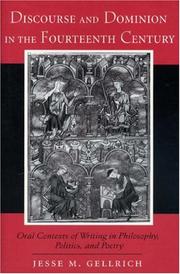
ISBN: 1282752219 9786612752216 1400821665 1400811716 9781400811717 9780691037493 0691037493 1400802652 1400802636 Year: 1995 Publisher: Princeton, N.J. Princeton University Press
Abstract | Keywords | Export | Availability | Bookmark
 Loading...
Loading...Choose an application
- Reference Manager
- EndNote
- RefWorks (Direct export to RefWorks)
This wide-ranging study of language and cultural change in fourteenth-century England argues that the influence of oral tradition is much more important to the advance of literacy than previously supposed. In contrast to the view of orality and literacy as opposing forces, the book maintains that the power of language consists in displacement, the capacity of one channel of language to take the place of the other, to make the source disappear into the copy. Appreciating the interplay between oral and written language makes possible for the first time a way of understanding the high literate achievements of this century in relation to momentous developments in social and political life. Part I reassesses the "nominalism" of Ockham and the "realism" of Wyclif through discussions of their major treatises on language and government. Part II argues that the chronicle histories of this century are tied specifically to oral customs, and Part III shows how Sir Gawain and the Green Knight and Chaucer's Knight's Tale confront outright the displacement of language and dominion. Informed by recent discussions in critical theory, philosophy, and anthropology, the book offers a new synoptic view of fourteenth-century culture. As a critique of the social context of medieval literacy, it speaks directly to postmodern debate about the politics of historicism today.
Philosophy, Medieval. --- Oral-formulaic analysis. --- Discourse analysis, Literary. --- Written communication --- Politics and literature --- Oral tradition --- English literature --- Medieval philosophy --- Scholasticism --- Formulaic analysis, Oral --- Folk literature --- Folklore --- Literary discourse analysis --- Rhetoric --- Literary style --- Written discourse --- Written language --- Communication --- Discourse analysis --- Language and languages --- Visual communication --- History --- History and criticism. --- History and criticism --- Methodology --- England --- Great Britain --- Languages. --- Civilization --- Historiography. --- Discourse analysis, Literary --- Oral-formulaic analysis --- Philosophy, Medieval --- History. --- Literature --- Literature and politics --- Tradition, Oral --- Oral communication --- Oral history --- Political aspects
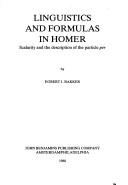
ISBN: 9027220573 1556190468 9786613424105 128342410X 902727441X 9789027274410 9781556190469 9789027220578 Year: 1988 Publisher: Amsterdam : Benjamins,
Abstract | Keywords | Export | Availability | Bookmark
 Loading...
Loading...Choose an application
- Reference Manager
- EndNote
- RefWorks (Direct export to RefWorks)
The purpose of this study is to provide a description of the Greek particle per as it occurs in the text of Homer. As such it is a contribution to the study of Ancient Greek in general and of the Greek' particles in particular. But the work transgresses the boundaries of Greek linguistics' proper. First, the discussion of per as a scalar article contributes to the discussion of scalar phenomena in general. Second, as a description of a linguistic feature in the Iliad and Odyssey, metrical texts of oral-formulaic origin, this study is also an essay in the relation between linguistics on the one
Classical Greek language --- Grammar --- Homer --- Greek language --- Per (The Greek word) --- Oral-formulaic analysis. --- Formulaic analysis, Oral --- Folk literature --- Folklore --- Oral tradition --- Classical languages --- Indo-European languages --- Classical philology --- Greek philology --- Particles. --- History and criticism --- Methodology --- Etymology --- Hóiméar --- Hūmīrūs --- Homeros --- Gomer --- Omir --- Omer --- Omero --- Ho-ma --- Homa --- Homérosz --- האמער --- הומירוס --- הומר --- הומרוס --- هومر --- هوميروس --- 荷马 --- Ὅμηρος --- Гамэр --- Hamėr --- Омир --- Homère --- Homero --- 호메로스 --- Homerosŭ --- Homērs --- Homeras --- Хомер --- ホメーロス --- ホメロス --- Гомер --- Homeri --- Hema --- Pseudo-Homer --- Pseudo Omero --- Language. --- Oral-formulaic analysis --- Grec (Langue) --- Analyse des formules orales --- Per (Le Mot grec) --- Particles --- Particules --- Language --- Grammar. --- Langue --- Grammaire --- Homerus
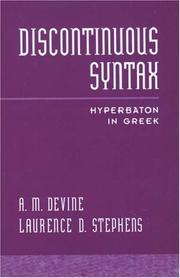
ISBN: 019513270X 0195344006 1280530715 1429400552 9781429400558 9780195344004 9780195132700 9781280530715 0197704506 Year: 2000 Publisher: New York (N.Y.) : Oxford university press,
Abstract | Keywords | Export | Availability | Bookmark
 Loading...
Loading...Choose an application
- Reference Manager
- EndNote
- RefWorks (Direct export to RefWorks)
The interface between syntax and meaning, both semantic and pragmatic, has emerged as an area of linguistics theory. This study applies some of these ideas to hyperbaton, offering a new theory with broad applications for our understanding of Greek syntax.
Greek language --- Oral-formulaic analysis --- Rhetoric, Ancient --- Word order --- Syntax --- Homer --- Language --- Oral-formulaic analysis. --- Rhetoric, Ancient. --- Syntax. --- Word order. --- Ancient rhetoric --- Classical languages --- Greek rhetoric --- Latin language --- Latin rhetoric --- Formulaic analysis, Oral --- Folk literature --- Folklore --- Oral tradition --- Indo-European languages --- Classical philology --- Greek philology --- Rhetoric --- History and criticism --- Methodology --- Homeros --- Homère --- Language. --- Homerus --- Hóiméar --- Hūmīrūs --- Gomer --- Omir --- Omer --- Omero --- Ho-ma --- Homa --- Homérosz --- האמער --- הומירוס --- הומר --- הומרוס --- هومر --- هوميروس --- 荷马 --- Ὅμηρος --- Гамэр --- Hamėr --- Омир --- Homero --- 호메로스 --- Homerosŭ --- Homērs --- Homeras --- Хомер --- ホメーロス --- ホメロス --- Гомер --- Homeri --- Hema --- Pseudo-Homer --- Pseudo Omero --- Greek language - Word order --- Greek language - Syntax --- Homer - Language
Book
ISBN: 9004270973 9789004270978 9789004269125 9004269126 Year: 2014 Publisher: Leiden: Brill,
Abstract | Keywords | Export | Availability | Bookmark
 Loading...
Loading...Choose an application
- Reference Manager
- EndNote
- RefWorks (Direct export to RefWorks)
The essays in Between Orality and Literacy address how oral and literature practices intersect as messages, texts, practices, and traditions move and change, because issues of orality and literacy are especially complex and significant when information is transmitted over wide expanses of time and space or adapted in new contexts. Their topics range from Homer and Hesiod to the New Testament and Gaius’ Institutes , from epic poetry and drama to vase painting, historiography, mythography, and the philosophical letter. Repeatedly they return to certain issues. Writing and orality are not mutually exclusive, and their interaction is not always in a single direction. Authors, whether they use writing or not, try to control the responses of a listening audience. A variable tradition can be fixed, not just by writing as a technology, but by such different processes as the establishment of a Panhellenic version of an Attic myth and a Hellenistic city’s creation of a single celebratory history.
Oral communication --- Written communication --- Transmission of texts --- Oral tradition in literature --- Oral-formulaic analysis --- Formulaic analysis, Oral --- Folk literature --- Folklore --- Oral tradition --- Literary transmission --- Manuscript transmission --- Textual transmission --- Criticism, Textual --- Editions --- Manuscripts --- Written discourse --- Written language --- Communication --- Discourse analysis --- Language and languages --- Visual communication --- Oral transmission --- Speech communication --- Verbal communication --- History and criticism --- Methodology --- Oral communication - Greece - Congresses --- Oral communication - Rome - Congresses --- Written communication - Greece - Congresses --- Written communication - Rome - Congresses --- Transmission of texts - Greece - Congresses --- Transmission of texts - Rome - Congresses --- Oral tradition in literature - Greece - Congresses --- Oral tradition in literature - Rome - Congresses --- Oral-formulaic analysis - Congresses
Book
ISBN: 1760460052 1760460060 9781760460068 9781760460051 Year: 2016 Publisher: ANU Press
Abstract | Keywords | Export | Availability | Bookmark
 Loading...
Loading...Choose an application
- Reference Manager
- EndNote
- RefWorks (Direct export to RefWorks)
This is a study in oral poetic composition. It examines how oral poets compose their recitations. Specifically, it is a study of the recitations of 17 separate master poets from the Island of Rote recorded over a period of 50 years. Each of these poets offers his version of what is culturally considered to be the ‘same’ ritual chant. These compositions are examined in detail and their oral formulae are carefully compared to one another. Professor James J. Fox is an anthropologist who carried out his doctoral field research on the Island of Rote in eastern Indonesia in 1965–66. In 1965, he began recording the oral traditions of the island and developed a close association with numerous oral poets on the island. After many subsequent visits, in 2006, he began a nine-year project that brought groups of oral poets to Bali for week-long recording sessions. Recitations gathered over a period of 50 years are the basis for this book..
Oral-formulaic analysis. --- Oral tradition --- Folk poetry, Indonesian --- Indonesian folk poetry --- Tradition, Oral --- Formulaic analysis, Oral --- Indonesian poetry --- Oral communication --- Folklore --- Oral history --- Folk literature --- History and criticism --- Methodology --- eastern indonesia --- oral poetry --- anthropology --- Delhi University Students' Union --- Dengka language --- Dialect --- Meno --- Rice --- Ringgou language --- Sacred language --- Termanu language --- Rote Ndao (Indonesia) --- Kabupaten Rote Ndao (Indonesia) --- Rote Ndao Regency (Indonesia)
Book
ISBN: 3631819048 3631819056 3631808003 Year: 2020 Publisher: Bern Peter Lang International Academic Publishing Group
Abstract | Keywords | Export | Availability | Bookmark
 Loading...
Loading...Choose an application
- Reference Manager
- EndNote
- RefWorks (Direct export to RefWorks)
The aim of this monograph is an attempt to examine the relationship between collective memory and oral texts. The material basis for this presentation consists of folklore oral texts, both prosaic and poetic, different as regards their genres (fairy tales, fables, recollections, traditions, legends, proverbs, and songs) as well as texts that are fragments of spontaneous interviews. The monograph consists of five main parts devoted to the following themes: theoretical considerations, the relation between memory and language, text memory, genre memory, and the relation between memory and the folk artistic style.
Oral-formulaic analysis. --- Formulaic analysis, Oral --- Folk literature --- Folklore --- Oral tradition --- History and criticism --- Methodology --- Collective --- Collective memory --- Cultural heritage --- Genre memory and Genre non-memory --- Memory --- Memory figures --- Memory in language --- Oral --- Style memory --- Text --- Text memory --- Texts of culture --- versus --- Wojcicka
| Listing 1 - 10 of 15 | << page >> |
Sort by
|

 Search
Search Feedback
Feedback About UniCat
About UniCat  Help
Help News
News